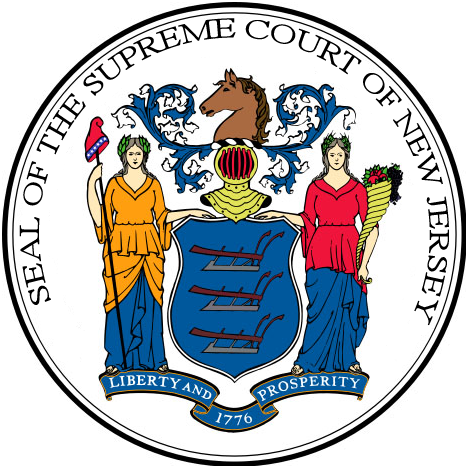A recent Ballotpedia study on state supreme courts revealed that of the seven justices on the New Jersey Supreme Court as of June 2020:
- Two justices had some level of affiliation with the Democratic party
- Four justices had a Republican affiliation
- One justice had an indeterminate partisan affiliation.
In “Ballotpedia Courts: State Partisanship”, we gathered a variety of data on 341 active state supreme court justices across the 50 states in order to understand their partisan affiliations. Based on this research, we placed each justice into one of five categories indicating our confidence in their affiliations with either the Democratic or Republican Parties. These categories are:
- Strong Democratic
- Mild Democratic
- Indeterminate
- Mild Republican
- Strong Republican
Our confidence measure shows that in 2020, there were two Mild Democrats on the New Jersey Supreme Court (Justices Stuart Rabner and Barry Albin), four Mild Republicans (Justices Lee Solomon, Anne Patterson, Jaynee LaVecchia, and Faustino Fernandez-Vina), and one Indeterminate justice (Justice Timpone). Justice Timpone retired on August 31, 2020, 10 weeks before his mandatory retirement date of November 10, to allow his replacement, Justice Fabiana Pierre-Louis, to join the bench for the September court session. As our study concluded in June 2020, we did not include Justice Pierre-Louis in our research.
New Jersey has informal, but no constitutional rules which mandate a partisan balance on the state supreme court. The National Center for State Courts describes New Jersey’s informal process of ensuring partisan balance on its state supreme court as follows:
“New Jersey’s courts also have a tradition of political balance. Governors, regardless of their party affiliation, have generally followed a policy of replacing outgoing judges with someone of the same party or philosophy. On the supreme court, the traditional balance is three Democrats and three Republicans, with the chief justice belonging to the party of the appointing governor.”
The state of New Jersey has two rules governing judicial appointments: one written, one unwritten. The written law requires that justices are subject to reappointment by the governor and reconfirmation by the legislature after an initial seven-year term. The unwritten rule is that the governor of the state of New Jersey is to appoint justices in a way that alternates the party of the justice each time he receives the opportunity to appoint a new justice to the court to ensure partisan balance on the court.
While John Corzine (D) was governor of New Jersey, he appointed two justices to the court, Helen Hoens and Stuart Rabner. One of his nominees, Stuart Rabner, was Gov. Corzine’s chief legal counsel and the attorney general for the state of New Jersey. Gov. Corzine also reappointed two Republican-leaning justices nominated to the bench by Governor Christine Todd Whitman (R) and one Democratic-leaning justice appointed to the bench by Governor James McGreevey (D).
Governor Chris Christie (R) broke the precedent in attempting to appoint another Republican-leaning justice to the state supreme court without first reappointing Justice Rabner. Gov. Christie also did not reappoint Helen Hoens, who was first appointed by Governor Christine Todd Whitman, and stated that he did so because he knew the Senate would reject her nomination. Justice Hoens is only the second justice in the history of New Jersey to sit on the court and not receive renomination after her second term. The only previous justice not to receive renomination was Justice John E. Wallace, a Gov. James McGreevey (D) appointment who Gov. Christie also did not renominate.
Gov. Christie’s Republican appointments recorded lower partisan Confidence Scores than the justices appointed by Whitman and Corzine. This means that, according to our data, Christie’s appointments were less partisan in their affiliations than the other New Jersey governors with appointments to the court. Christie’s appointments record an average Pure Partisan Score of 4.5. Whitman’s justices register an average Pure Partisan Score of 7. Corzine’s justices register an average Pure Partisan Score of 9. McGreevey’s justices record an average Pure Partisan Score of 7.
Additional reading:


